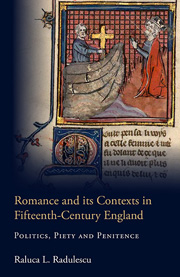Book contents
- Frontmatter
- Dedication
- Contents
- Acknowledgements
- Abbreviations
- Preface
- 1 Fifteenth-Century Contexts for the Reading of Middle English Romances
- 2 Spiritual Journeys through Political Realities: the ‘Pious’ Romances
- 3 Chronicling Britain's Christian Conversion: Henry Lovelich's History of the Holy Grail
- 4 The Politics of Salvation in Thomas Malory's Le Morte Darthur
- Afterword
- Appendix 1 Plot summaries
- Appendix 2 Genealogies
- Bibliography
- Index
4 - The Politics of Salvation in Thomas Malory's Le Morte Darthur
Published online by Cambridge University Press: 05 October 2013
- Frontmatter
- Dedication
- Contents
- Acknowledgements
- Abbreviations
- Preface
- 1 Fifteenth-Century Contexts for the Reading of Middle English Romances
- 2 Spiritual Journeys through Political Realities: the ‘Pious’ Romances
- 3 Chronicling Britain's Christian Conversion: Henry Lovelich's History of the Holy Grail
- 4 The Politics of Salvation in Thomas Malory's Le Morte Darthur
- Afterword
- Appendix 1 Plot summaries
- Appendix 2 Genealogies
- Bibliography
- Index
Summary
‘a tale cronycled for one of the trewyst and of ϸe holyest that ys in thys worlde.’
(1037.9–12; fol. 409r)The transmission of the pious romances selected in this study throughout the fifteenth century proposes, as indicated in Chapter 1, an ‘open envelope’ structure for the analysis of Lovelich's and Malory's projects. While Lovelich and his annotator Cok took a visible interest in both strands explored in this study, Malory's approach to one of the themes, the king's suffering, is not as evident as his concern over lineages. Furthermore, it is a commonplace in criticism to note Lancelot's pre-eminence in Le Morte Darthur (henceforth Morte), stemming from Malory's empathy for his favourite knight's values and inner conflicts. For these reasons another examination of Lancelot's position in the Morte from the viewpoint of the king's suffering may appear unnecessary. However, Malory repositioned Lancelot in the Middle English Arthurian tradition by adding justifications for his actions in the last two tales as well as more emphasis on his spiritual and political trajectories from the Grail Quest onwards. In some ways Lancelot overshadows Arthur towards the end of the Morte. As Malory's readers are encouraged to review Arthur's kingship and governance in the last two tales, Lancelot's model leadership in political and spiritual matters gains prominence in the narrative. Given his unwavering loyalty to his king and friend, Lancelot is no competitor to Arthur; yet Lancelot's model of spiritual and secular behaviour provides the audience with an alternative to Arthur's predominantly secular outlook.
- Type
- Chapter
- Information
- Romance and its Contexts in Fifteenth-Century EnglandPolitics, Piety and Penitence, pp. 149 - 197Publisher: Boydell & BrewerPrint publication year: 2013



